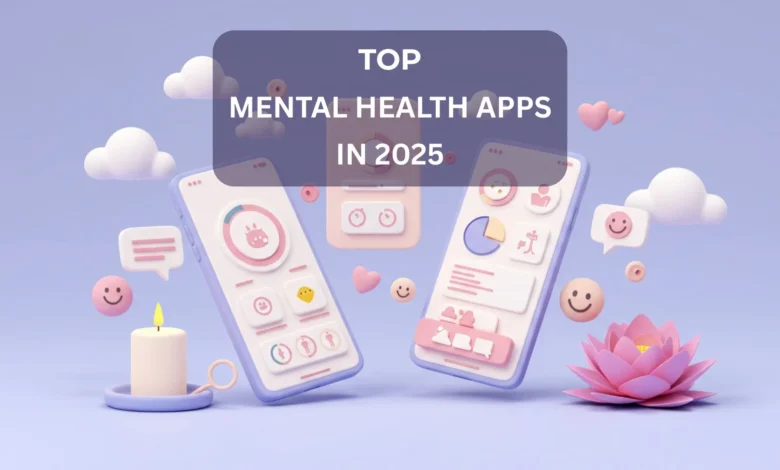Top Mental Health and Burnout Apps to Boost Your Wellbeing in 2025

As life becomes more digitally connected and professionally demanding, emotional exhaustion and mental health struggles are more common than ever. Whether it’s managing anxiety, building emotional resilience, or avoiding burnout, having the right tools at your fingertips is essential.
With rising awareness, more people are turning to mental health apps to manage daily stress, track mood patterns, and create self-care routines that actually work. In 2025, these apps have become smarter, more personalized, and more accessible, giving individuals better ways to stay emotionally balanced.
The Growing Demand for Digital Mental Wellness
More people than ever are looking for support that fits into their everyday life. Between work demands, financial pressures, family responsibilities, and global uncertainties, stress levels are at an all-time high. Traditional therapy, while valuable, isn’t always accessible whether due to cost, location, or time.
This is where digital tools play a vital role. Apps designed to support mental health offer structure, insight, and reflection all within your smartphone. Many include daily check-ins, guided exercises, mental health assessments, and journaling tools. With AI and personalization, 2025’s apps offer even more advanced, user-centric support.
What to Look for in a Good Mental Health App
Not every app is created equal. The most effective ones in 2025 share a few key features:
Personalized Insights: Instead of one-size-fits-all advice, the best apps tailor suggestions based on your habits, mood logs, and goals.
Real-Time Tracking: These tools help users identify patterns, triggers, and progress over time.
Guided Activities: Breathing exercises, sleep aids, and mindfulness sessions are now common features.
Integrated Goal Setting: Emotional wellbeing isn’t just about reflection; it’s about action. Great apps help users set small goals for daily improvement.
Security & Privacy: With sensitive information involved, encryption and user control over data is a must.
Burnout in the Digital Age
While anxiety and depression have long been studied, burnout has only recently been recognized as a serious condition. It’s not just “being tired from work” it’s a long-term emotional and physical collapse caused by chronic stress.
Symptoms of burnout can include:
Constant fatigue
Feeling detached or cynical about your job
Lack of productivity
Trouble concentrating
Emotional numbness or irritability
Burnout is especially common among healthcare workers, educators, corporate employees, and entrepreneurs but anyone can be affected.
The Role of a Burnout App
Preventing burnout is easier than recovering from it. In 2025, specialized tools are now available to monitor early warning signs and support recovery. A burnout app typically focuses on:
Tracking work/rest balance
Identifying physical and emotional warning signs
Offering break reminders and micro-habits
Encouraging reflection and boundary setting
Providing structured plans to restore energy
These apps serve as early detection systems, helping users recognize overload before it turns into long-term damage.
How These Apps Help in Daily Life
Apps today are more than just “journals on your phone.” They play an active role in guiding users through difficult moments. Some ways they provide support include:
Daily Mood Check-ins: Understand how you’re really feeling
Crisis Planning: Know what steps to take during high-stress situations
Wellbeing Routines: Establish consistent sleep, nutrition, and rest habits
Cognitive Exercises: Reframe negative thoughts through journaling and thought-challenging tools
Progress Tracking: Stay motivated by seeing how far you’ve come
This real-time feedback loop helps users stay connected to their emotional state and make better daily choices.
Mental Health in the Workplace
Companies in 2025 have also started integrating wellness tools into their operations. Corporate wellness programs often include app subscriptions, team wellbeing check-ins, and stress management workshops. Apps that offer anonymous insights and data dashboards help HR teams understand overall team health without compromising individual privacy.
This has improved not only employee morale but also productivity and retention.
Read Also: The Benefits of Reverse Osmosis Water Filtration for Your Health and Home
Final Thoughts
As stress, anxiety, and burnout continue to impact millions, the tools we use to support emotional well-being must evolve. Fortunately, 2025 has introduced a wide range of smart, thoughtful, and effective digital solutions.
Whether you’re managing daily stress or recovering from long-term emotional fatigue, mental health apps provide an accessible and effective path forward. Likewise, a good burnout app can help you catch early signs of overload before they spiral out of control.
Taking small steps every day to monitor your well-being is no longer optional, it’s essential. And with the right tools, that journey becomes a little easier.




